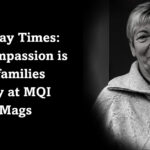New Research Highlights Inadequacy of Supports for Women Experiencing Problematic Substance Use
A summary of the report is available HERE
To read the full report, go to Understanding the intersectionality of women’s substance use in the Irish context
A new study by Dr Sarah Morton et al. – ‘You can’t fix this in six months’: Understanding the intersectionality of women’s substance use in the Irish context – has shown that women link their substance use to a number of complex and interconnecting issues that require specialist interventions to ensure recovery, emotional and physical safety, and improved wellbeing.
The research was funded by the Irish Research Council New Foundations Scheme and was published by University College Dublin and Merchants Quay Ireland (MQI), the national voluntary organization that supports people who are homeless and those affected by addiction.
The research aimed to explore the lived experiences of women who are dealing with multiple issues which contributed to their substance use and how these relate to factors such as motherhood, poverty, social exclusion, trauma, domestic violence, transactional sex, homelessness and involvement in the criminal justice system.
Amongst the report’s key findings were;
- Most women used a range of substances, depending on their effect, availability, process of initiation into use, and reaction to other challenges and life events. Use of prescription medication was a common experience, often in response to traumatic experiences.
- For many of the women, there was parental substance use, and experiences of neglect or abuse within their own childhood, although this was not universal and for some, immediate family members were a source of support.
- It was very common for women to be initiated or groomed into substance use and an intimate relationship by an older male when they were in their teens or early adulthood. The resulting intimate relationship was often abusive or involved sexual or other forms of exploitation.
- Domestic and gender-based violence was experienced by all the participants and this impacted negatively on their experiences of pregnancy, motherhood, access to support and substance use trajectories.
- Two main factors influenced positive change processes for women; the needs of children for those who were mothers; and involvement with any aspect of the criminal justice system. This was despite the fact these were often negative life events.
- Where women had experienced positive change, supportive practitioners that prioritised women’s safety and sought to build trust regardless of the challenging nature of the situation were highlighted repeatedly as key to starting a recovery process.
- The need for female-only services, for treatment options that supported motherhood and interventions that recognised the wide range of women’s experiences of exploitation, trauma and abuse were strongly highlighted.
To mark the publication of the report, Acting Minister for Justice, Simon Harris said:
‘This research gives us an invaluable insight into the complexity of the challenges and experiences faced by women using substances. The use of substances is often driven by trauma and violence. This Government is absolutely determined to shine a light on these issues. We have prioritised domestic, sexual, and gender-based violence and will shortly move to establish a new agency, which can drive the necessary reforms highlighted by the research. This research also points to the need for an education system that opens its doors to women dealing with trauma and offers them a second chance. That is the mission of the Department of Further and Higher Education – to break down the silos and ensure everyone can access education. This research will help us in realising that vision.’
Speaking at the launch of the report, MQI CEO Paula Byrne said;
‘Through the voices of women, this research shines a spotlight on the complexity and multi-faceted nature of female substance use. In responding to these challenges we need to provide comprehensive gender-specific and trauma-informed services throughout the country as a matter of urgency.’
Report author Dr Sarah Morton said:
‘It has been really important to hear from women about the complexities of their experiences and how they feel their substance use may link with all of these other life experiences and traumas. Ultimately we need to centre stage women’s safety and ensure the risk of violence and abuse is minimised in their lives as the ultimate tool in prevention.’
-ENDS-
Notes to the editor:
About Merchants Quay Ireland
Merchants Quay Ireland is the national charity working with people who are homeless and in addiction. The organisation provides services ranging from open-access crisis intervention and health promotion services to day-support programmes, residential treatment, detox, and prison counselling.

